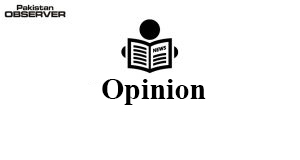Articles and letters may be edited for the purposes of clarity and space. They are published in good faith with a view to enlightening all the stakeholders. However, the contents of these writings may not necessarily match the views of the newspaper.
Emergence of new world order
The global hegemony of US has remained unchallenged for long yet with gradual replacement, as we enter into the period of ‘Chinese influenced world-order’ it will have its own ramifications nationally and internationally.
The US troops withdrawal from Afghanistan which completed in August 2021 posed US on a losing side perspective because of its failure of results that it claimed to achieve when it came into Afghanistan post 9/11, illustrating its 20 years war as wasted. Then rising GDP of China since 2017 after overtaking the US. According to the World Bank, China GDP was 11% of the US in 1960 and it was 67% of the US as of 2021, showing its positive acceleration. The economic think tanks believe that China would surpass America within a decade of time, if not less.
ASAD KHAN
Via email
Privacy risk
In this technology world, contact and monitoring of privacy constitute private sector spying and are overly problematic. However, Article 14 of the Constitution recognises the right to protection of a person’s right to privacy in their residence and to their dignity as a basic right. The information we provide to seemingly innocuous social media firms may be used to create psychological profiles of us, influence our political preferences, and polarise our democracies. Hackers can easily access the phone if they follow users on social media and look at their profiles. Search engines record user data and make it available to everyone, including any agency. Although we willingly share our data, we are unaware that doing so could make us victims of terrorism.
Furthermore, political rivals in Pakistan are threatening one another with claims of phone tapping, but no one is showing any real concern over these users’ privacy. How a PM or other high official’s phone can be so easily hacked is shameful and not a good sign for other officials, such as the other country’s ambassador to Pakistan, or for how that official may feel secure while attending high-level meetings at the Pakistani PM’s house. There is a risk to privacy, but no one seems to care or prioritise this. If a hacker can do this to high-ranking politicians like the PM, how much privacy damage has been caused by ordinary people who are still unaware?
On the other hand, when companies and governments store our personal data, our privacy is compromised. In order to fulfil and secure the promise of Article 14, our legislatures and courts must act quickly to recognise and affirm our right to keep our information private. If they don’t, Pakistani citizens risk losing their right to privacy. As a result, privacy, which has undoubtedly become the hottest topic since phone taps, should be protected and the citizens of Pakistan should be assured that all of their data, regardless of format, is in safe hands.
FARHAN ALI SIYAL
Hyderabad, Sindh
Girls College without transport
In a hot and dry day in district Kech’s area of Shapuk, some 34 kilometres away from main Turbat city, many college girls turned to China Pakistan Economic Corridor (CPEC) route blocking it in protest. The college girls belonged to Kassak (19 kilometres), Shapuk (34 kilometres), Sami (43 kilometres) and Herronk (60 kilometres) in the east of the Turbat city. They complained their college bus was dysfunctional for over a year seriously disturbing their education. When they were absent due to mentioned cause, college administration issued notification of expelling those students due to long absence. When they demanded transportation, they were asked to manage it themselves. After they asked private cars, the drivers demanded 4000 per month, which most students failed to fulfil. Failing to find any possible solution, the college girls turned to CPEC route and blocked it.
The largest-by-area province of Pakistan also holds the record for being most neglected region. For last two decades in particular, Balochistan has witnessed horrible circumstances in every department including larger impacts on education. In educational sector, although girls have faced many hurdles as compare to boys, it was always a collective deprivation for both genders. The recent protest by Degree College Turbat girls is one such example, which has showed the pathetic image of educational emergency in the region. “We asked college principal to provide us transportation, but she suggested to protest on road adding that the college had run out of funds,” Ganji Baloch, one of the protesting students, said.
They tried every possible mean from last one year to get a bus but have continuously failed to gain administrative and governmental attention. From press club to roads, district and college administrations to governmental officials, these young girls have not left any stone unturned to get their problem solved, but all they received was disappointment. “They should at least have the courage to tell us at our face that they are hapless to get us a bus,” she said.
ALI JAN MAQSOOD
Via email










